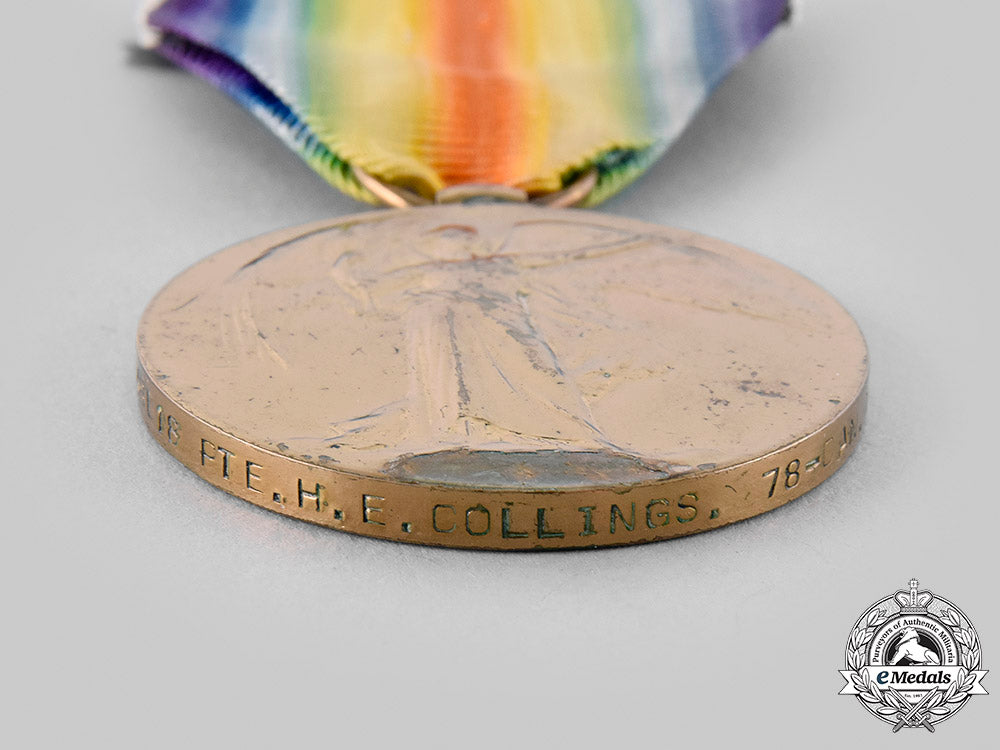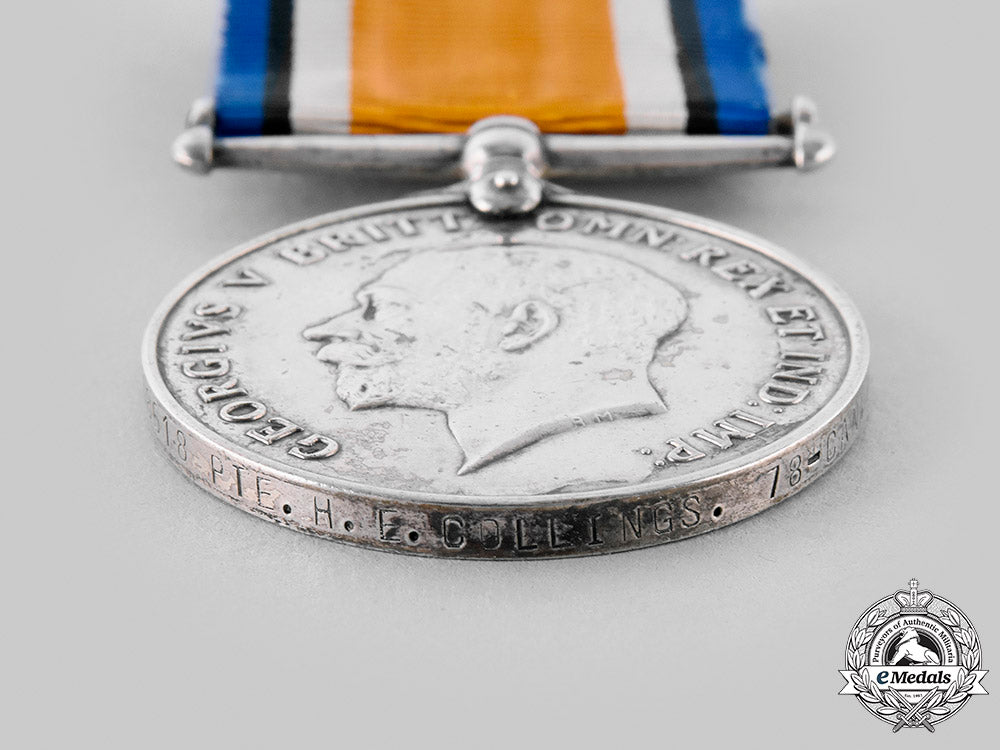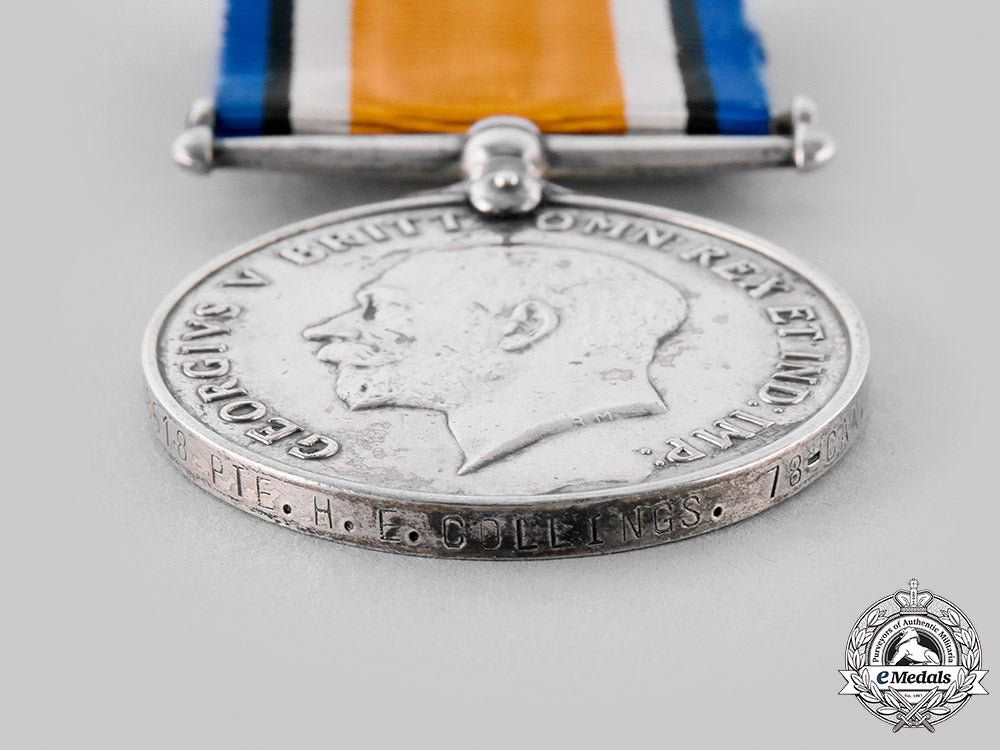
LOADING ...
In response to evolving domestic opinion, eMedals Inc has made the conscious decision to remove the presentation of German Third Reich historical artifacts from our online catalogue. For three decades, eMedals Inc has made an effort to preserve history in all its forms. As historians and researchers, we have managed sensitive articles and materials with the greatest of care and respect for their past and present social context. We acknowledge the growing sentiments put forth by the Canadian public and have taken proactive actions to address this opinion.




Canada, Cef. A Medal Pair, 78Th Infantry Battalion, Gassed 1918
Canada, Cef. A Medal Pair, 78Th Infantry Battalion, Gassed 1918
SKU: ITEM: C6137
Current Bid:
Your Max Bid:
Bid History:
Time Remaining:
Couldn't load pickup availability
Shipping Details
Shipping Details
eMedals offers rapid domestic and international shipping. Orders received prior to 12:00pm (EST) will be shipped on the same business day.* Orders placed on Canadian Federal holidays will be dispatched the subsequent business day. Courier tracking numbers are provided for all shipments. All items purchased from eMedals can be returned for a full monetary refund or merchandise credit, providing the criteria presented in our Terms & Conditions are met. *Please note that the addition of a COA may impact dispatch time.
Shipping Details
eMedals offers rapid domestic and international shipping. Orders received prior to 12:00pm (EST) will be shipped on the same business day.* Orders placed on Canadian Federal holidays will be dispatched the subsequent business day. Courier tracking numbers are provided for all shipments. All items purchased from eMedals can be returned for a full monetary refund or merchandise credit, providing the criteria presented in our Terms & Conditions are met. *Please note that the addition of a COA may impact dispatch time.
Description
Description
British War Medal (148618 PTE. H.E. COLLINGS. 78-CAN.INF.); and Victory Medal (148618 PTE. H.E. COLLINGS. 78-CAN.INF.). Naming is officially impressed. Un-mounted, light contact, original ribbons, better than very fine.
Footnote: Harold Edwin Collins was born on October 9, 1891 in Charlottetown, Prince Edward Island. He was a resident of Winnipeg, Manitoba when he signed his Attestation Paper as a Private (148618) with the 78th Infantry Battalion "Winnipeg Grenadiers", on December 24, 1915 in Winnipeg, Manitoba, naming his next-of-kin as his mother, Mrs. Charlotte (John) Collins of Lethbridge, Alberta (as of March 28, 1916, she was listed as being in Charlottetown, PEI), at the age of 24, stating the he was with an Active Militia, the 100th Winnipeg Grenadiers, that he was not married, that his religion was Methodist and that his trade was that of Clerk. His next-of-kin was later changed in his records to his sister, Mrs. E.J. Herbert of Bangor, Maine. The Battalion was raised and mobilized in Winnipeg, Manitoba under the authority of G.O. 103A, August 15, 1915. The Battalion sailed May 20, 1916 from Halifax, Nova Scotia aboard the S.S. Empress of Britain, under the command of Lieutenant-Colonel J. Kirkcaldy with a strength of 37 officers and 1,097 other ranks, disembarking in Liverpool, England on May 30th. The 78th Infantry Battalion would serve in France and Belgium with the 12th Infantry Brigade, 4th Canadian Division. Six weeks after arriving in England, Private Collings proceeded overseas for service in the French theatre from Southampton, England on August 12, 1916, arriving in Le Havre, France on the 13th. The following month, he was "sentenced to 7 days' Field Punishment No. 1 and charged with value of equipment 6/- for losing by neglect part of (the) equipment, gas helmets for goggles and satchel value 6/-" on September 2, 1916. Field Punishment No. 1 consisted of the convicted man being placed in fetters and handcuffs or similar restraints and attached to a fixed object, such as a gun wheel or a fence post, for up to two hours per day. During the early part of the First World War, the punishment was often applied with the arms stretched out and the legs tied together, giving rise to the nickname "crucifixion".
Almost two years after arriving in the French theatre, Private Collings became sick, as he had been wounded as the result of a gas shell attack on July 31, 1918. He was initially treated at No. 13 Canadian Field Ambulance, then transferred the same day to No. 12 Canadian Field Ambulance, then admitted to No. 14 Canadian Field Ambulance later that day. He would be treated for the next fifteen days at No. 14 Canadian Field Ambulance before being discharged to duty on August 15th, rejoining his unit on September 18th. Three months after rejoining his unit and with the hostilities having ceased, he was granted 14 days' leave to the United Kingdom on December 21, 1918. While on leave in England, he was admitted "sick" to the Canadian Hospital Etchinghill at Lyminge and posted to the Manitoba Regimental Depot at Seaford on January 11, 1919. It was here that he was diagnosed with "V.D.G." (venereal disease, gonorrhea) and would spend the next fifty-four days recovering from the malady. However, while in hospital, he would run afoul of the authorities, as he was awarded 28 days' detention on March 3rd, "for (i) being in improper possession of Khaki, (ii) drunk and (iii) while a V.D. (venereal disease) patient, breaking out of hospital, thereby delaying cure of the disease". Three days later, he was released from hospitalization on March 6th, however, he would return to Etchinghill on April 1st, once again to be treated for the gonorrhea, a treatment that would last six weeks, before being discharged from hospitalization on May 13th. Upon discharge from hospital, he was taken on strength from the Manitoba Regimental Depot at Seaford and posted to the 18th Reserve Battalion on May 14, 1919. By June 5, 1919, he was acknowledged in his medical records as having a tattoo of the 78th Infantry Battalion badge on his right forearm. He "forfeited two days' pay and 92 days' pay by P. & A." on June 13, 1919 and was transferred from the 18th Reserve Battalion to the Canadian Machine Gun Depot at Seaford on June 14th. He was struck off strength of the Overseas Military Forces of Canada, upon transfer to the Canadian Expeditionary Force in Canada at Seaford on June 18, 1919. He embarked Liverpool, England aboard the S.S. Baltic on June 26, 1919, arriving in Halifax, Nova Scotia on July 4th. Private Harold Edwin Collins, 78th Infantry Battalion was discharged upon demobilization at Dispersal Station "F", Military District No. 4 in Montreal, Quebec, on July 8, 1919, credited with having served in Canada, England, France and Belgium, entitled to wear the War Service Badge, Class "A", number 295151. For his First World War service, he was awarded the British War Medal and the Victory Medal.
Description
British War Medal (148618 PTE. H.E. COLLINGS. 78-CAN.INF.); and Victory Medal (148618 PTE. H.E. COLLINGS. 78-CAN.INF.). Naming is officially impressed. Un-mounted, light contact, original ribbons, better than very fine.
Footnote: Harold Edwin Collins was born on October 9, 1891 in Charlottetown, Prince Edward Island. He was a resident of Winnipeg, Manitoba when he signed his Attestation Paper as a Private (148618) with the 78th Infantry Battalion "Winnipeg Grenadiers", on December 24, 1915 in Winnipeg, Manitoba, naming his next-of-kin as his mother, Mrs. Charlotte (John) Collins of Lethbridge, Alberta (as of March 28, 1916, she was listed as being in Charlottetown, PEI), at the age of 24, stating the he was with an Active Militia, the 100th Winnipeg Grenadiers, that he was not married, that his religion was Methodist and that his trade was that of Clerk. His next-of-kin was later changed in his records to his sister, Mrs. E.J. Herbert of Bangor, Maine. The Battalion was raised and mobilized in Winnipeg, Manitoba under the authority of G.O. 103A, August 15, 1915. The Battalion sailed May 20, 1916 from Halifax, Nova Scotia aboard the S.S. Empress of Britain, under the command of Lieutenant-Colonel J. Kirkcaldy with a strength of 37 officers and 1,097 other ranks, disembarking in Liverpool, England on May 30th. The 78th Infantry Battalion would serve in France and Belgium with the 12th Infantry Brigade, 4th Canadian Division. Six weeks after arriving in England, Private Collings proceeded overseas for service in the French theatre from Southampton, England on August 12, 1916, arriving in Le Havre, France on the 13th. The following month, he was "sentenced to 7 days' Field Punishment No. 1 and charged with value of equipment 6/- for losing by neglect part of (the) equipment, gas helmets for goggles and satchel value 6/-" on September 2, 1916. Field Punishment No. 1 consisted of the convicted man being placed in fetters and handcuffs or similar restraints and attached to a fixed object, such as a gun wheel or a fence post, for up to two hours per day. During the early part of the First World War, the punishment was often applied with the arms stretched out and the legs tied together, giving rise to the nickname "crucifixion".
Almost two years after arriving in the French theatre, Private Collings became sick, as he had been wounded as the result of a gas shell attack on July 31, 1918. He was initially treated at No. 13 Canadian Field Ambulance, then transferred the same day to No. 12 Canadian Field Ambulance, then admitted to No. 14 Canadian Field Ambulance later that day. He would be treated for the next fifteen days at No. 14 Canadian Field Ambulance before being discharged to duty on August 15th, rejoining his unit on September 18th. Three months after rejoining his unit and with the hostilities having ceased, he was granted 14 days' leave to the United Kingdom on December 21, 1918. While on leave in England, he was admitted "sick" to the Canadian Hospital Etchinghill at Lyminge and posted to the Manitoba Regimental Depot at Seaford on January 11, 1919. It was here that he was diagnosed with "V.D.G." (venereal disease, gonorrhea) and would spend the next fifty-four days recovering from the malady. However, while in hospital, he would run afoul of the authorities, as he was awarded 28 days' detention on March 3rd, "for (i) being in improper possession of Khaki, (ii) drunk and (iii) while a V.D. (venereal disease) patient, breaking out of hospital, thereby delaying cure of the disease". Three days later, he was released from hospitalization on March 6th, however, he would return to Etchinghill on April 1st, once again to be treated for the gonorrhea, a treatment that would last six weeks, before being discharged from hospitalization on May 13th. Upon discharge from hospital, he was taken on strength from the Manitoba Regimental Depot at Seaford and posted to the 18th Reserve Battalion on May 14, 1919. By June 5, 1919, he was acknowledged in his medical records as having a tattoo of the 78th Infantry Battalion badge on his right forearm. He "forfeited two days' pay and 92 days' pay by P. & A." on June 13, 1919 and was transferred from the 18th Reserve Battalion to the Canadian Machine Gun Depot at Seaford on June 14th. He was struck off strength of the Overseas Military Forces of Canada, upon transfer to the Canadian Expeditionary Force in Canada at Seaford on June 18, 1919. He embarked Liverpool, England aboard the S.S. Baltic on June 26, 1919, arriving in Halifax, Nova Scotia on July 4th. Private Harold Edwin Collins, 78th Infantry Battalion was discharged upon demobilization at Dispersal Station "F", Military District No. 4 in Montreal, Quebec, on July 8, 1919, credited with having served in Canada, England, France and Belgium, entitled to wear the War Service Badge, Class "A", number 295151. For his First World War service, he was awarded the British War Medal and the Victory Medal.




You May Also Like
Japan, Empire. A T90 Civil Defense Helmet, c.1943
W8287
Canada, CEF. A Large Oval Photo
C7175
Germany, SA. A Model 1933 Service Dagger, SA-Gruppe Nordsee, by Friedrich von der Kohlen
G59818
Germany, SA. A Model 1933 Service Dagger, SA-Gruppe Pommern, by Gustav Wirth
G59816
Germany, Imperial. An Imperial Navy Deck Officer’s Visor Cap Insignia
M0231-130
-
Japan, Empire. A T90 Civil Defense Helmet, c.1943
W8287
Add to CartRegular price $275 USDRegular price $0 USD Sale price $275 USDUnit price / per -
Canada, CEF. A Large Oval Photo
C7175
Add to CartRegular price $120 USDRegular price $0 USD Sale price $120 USDUnit price / per -
Germany, SA. A Model 1933 Service Dagger, SA-Gruppe Nordsee, by Friedrich von der Kohlen
G59818
Add to CartRegular price $980 USDRegular price $0 USD Sale price $980 USDUnit price / per -
Germany, SA. A Model 1933 Service Dagger, SA-Gruppe Pommern, by Gustav Wirth
G59816
Add to CartRegular price $980 USDRegular price $0 USD Sale price $980 USDUnit price / per -
Germany, Imperial. An Imperial Navy Deck Officer’s Visor Cap Insignia
M0231-130
Add to CartRegular price $200 USDRegular price $0 USD Sale price $200 USDUnit price / per
Do you have a similar item you are interested in selling?
Please complete the form and our client care representatives will contact you.
Sell Item












